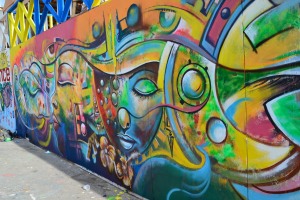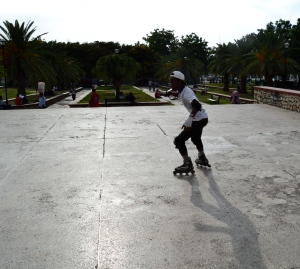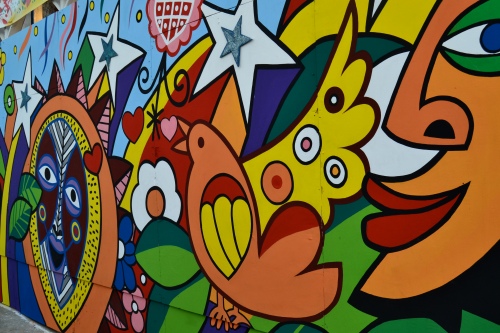
I started travelling seriously about a decade ago. More than 30 countries and countless airports later, perhaps the most valuable lesson I’ve learnt is in the power of story telling. I’ve been repeatedly appalled at the way in which stories about poor places especially, are contorted and manipulated, so that we, the privileged can exploit them to make money or to assuage whatever sense of entitlement we have within ourselves. Like Marlow and Kurtz, we need to construct a darkness and pierce its heart as a framing device for our own stories of self discovery and coming of age. Journalism and media especially, only tells those stories that will provoke a reaction in the emotionally stunted and intellectually stultified bourgeoisie, and that means, stories about hunger, violence, death and suffering. The developing world is like a Colosseum, where we can be titillated with images of struggle tearing apart the flesh of the poor.
By the late twentieth century the commodification, packaging, and merchandising of reality which constitute the knowledge industry have come to predominate almost to the exclusion of actual content.
Edward Said “How Not to Get Gored” in Reflections on Exile, Harvard University Press
In West Africa they have what are called griots – a historian whose job it is to record the history of the community and perpetuate it through story telling and song. A griot doesn’t simply stop at repeating narratives that have already been told. They also must interpret them in a way that is accessible to contemporary society. They have to add yarn to the weaving in order to extend and enrich it. A griot is a link between the past and the present, who allows the community context: an opportunity to catalogue their evolution and chart a way forward. Griotry is to me, a very powerful and easy way in which the poor can take ownership of the narratives of control or domination and tell their own stories on their own terms.

I write, I sing and I take photographs because I see myself as a modern griot. I grew up with very little and now I have more than most. From this uncomfortable space between two worlds, none of which is mine and neither of which will let me go, I see my opportunity to tell stories about places that resist exploitative narratives and instead tell stories of empowerment. I can speak the truth of the oppressed in the language of the oppressor. As a young, African, black, female traveller, I have found that I have a unique opportunity to peer behind the veil in many communities. Everybody’s expectations of me are so low, calibrated by the insidious destruction of sexism, racism, ageism, xenophobia and other isms. I am overlooked no matter what society I go into, and that means I can almost sneak around, collecting my stories, weaving my yarn, adding to the tapestry of my own historical education. I choose to be a contemporary griot because I am disempowered in the narratives of the communities that I live in, and story telling gives me the power to write against that.
And because the social world includes the person or subject doing the studying as well as the object or realm being studied, it is imperative to include them both in any consideration of Orientalism.
E. Said, “Orientalism Reconsidered”
To fulfil their role, a trans-national griot must allow themselves to become a student of history. One must make the effort to learn about its history, it’s culture, it’s people. Where possible, one must aside their own cultural background and completely immerse themselves in the new world. If everyone walks to work, so do you. Listen to the music they listen to, read the books they are reading. Eat the food they are eating. Where impossible, a griot must remain conscious of the yardstick in the back of their minds: those inevitable comparisons with “home”.
But a griot must also have a foot in the present. A griot must be an observer of people, conscious that everything is happening across three planes: the visible, the unspoken and the historical. A handshake can’t just be a handshake. A griot will observe the mechanics of the handshake, consider what these mechanics say about the interactions across age, gender, social class etc, and then reflect on how the particular style of the handshake may have evolved over time. The fistbump and its relation to the drug trade. The hi-five as a statement on familiarity.
So far as Orientalism in particular and the European knowledge of other societies in general have been concerned, historicism meant that one human history uniting humanity either culminated in or was observed from the vantage point of Europe or the West. What was neither observed by Europe nor documented by it was therefore, “lost” until some a later date when it could be incorporated into the new sciences of anthropology, political economy and linguistics.
Edward Said, “Orientalism Reconsidered”, in Reflections on Exile, Harvard University Press
What I’ve experienced in Haiti over the last 10 weeks has only reaffirmed the need for contemporary, poor societies to resurrect the tradition of griotry. Look, no media houses are interested in hearing stories of hope or triumph. No one wants to run the stories about women surviving rape and building thriving communities. No one wants to begin to contemplate a tale that doesn’t have a white saviour at it’s centre, swooping in, reorganising and rebuilding a random outpost of blackness or otherness. Hiding behind claims of interest or market based dynamics, modern media is only concerned with the next biggest story, at the expense of sober reflection, empathy and basic human kindness.
So if all you look at is the here and now, then yes, by those metrics Haiti is struggling, and everybody wants to run that story. But using the broadness of griotry you peer behind the veil and see a society that is actually thriving in the face of generations of exploitation, manipulation. Media asks the question: why isn’t Haiti the United States? The wrong question that ultimately lead to a poisonous answer. A better question would be: why is Haiti where it is today? Thinking about the country, on it’s own terms. And inevitably you conclude that Haiti should be so much worse off than it is right now. Only a holistic approach will inform you of why that is.
To foreground information and expertise is in many ways to say that what matters can be pushed up to the surface, and that history, insofar as it is out of easy reach, is better forgotten or, if it can’t be forgotten, ignored.
E. Said, “How to Not Get Gored”
The publishing industry falls over itself to seek out the next big expert on poverty, who will give them a snapshot of a complex society using the deeply flawed tools of their chosen discipline. What we end up with, is narratives about places like Haiti that focus on how bleak and unforgiving it is. We have a whole generation of people that will never come to Haiti believing that there is nothing worth salvaging here. A class of aid workers who have been conditioned to see struggle as a symptom of imminent political failure rather than the latest manifestation of a global economic system predicated on exploitation. A cabal of development professionals who are conditioned to live and interact with local communities from a place of fear, because the story tellers only tell those stories that titillate with the prospect of terror.

We need griots to write back against this culture of whitewashing, this idea that outside the control of Western governments and institutions communities of colour are random, disorganised and ungovernable. We need griots to tell other parts of the developing world that none of us is as far back as the media would have us believe. We need griots to remind us of the times when we were kings and queens, to re-instill that sense of pride and self-sufficiency. We need griots to heal the collective spirits that have been broken by generations of exploitation and abuse. We need griots to inspire the current generation to aspire to greatness and the collective good.
We need griots because the constructions of Western academia are suited to privilege certain types of knowledge or perspective. We need griots because these instruments were not designed to tell our stories on our own terms. We need griots because when we look at the gingerbread houses in Port-au-Prince we can’t just see dilapidation and neglect. We need griots to see the ingenuity of Haitian people, the durability of their aspirations in the face of adversity, the interruption of capitalism and the march to centralisation that curtailed their expansion. We need griots to paint us a bigger picture and keep things in perspective. We need griots because traditional spaces are not open to narratives of triumph from the developing world, and to paraphrase the words of Zora Neale Hurston, if we do not speak up they will kill us and say we liked it.

Insofar as it is run by and for Western interests, mainstream publishing isn’t going to do that for us. It isn’t going to allow us to come in and write back against our oppression or stake a claim to our human dignity, when there is so much money to be made from peddling the gore at the Colosseum. Griotry, embracing the fluidity of story telling and doing away with misguided aspirations towards “objectivity” at the expense of accounting human failure, is an excellent opportunity for us to do just that. It is our chance to write and speak back against broken and incomplete narratives that shortchange us of our dignity as individuals and communities.
We cannot proceed unless we dissipate and redispose the material of historicism into radically different pursuits of knowledge, and we cannot do that until we are aware that no new projects of knowledge can be constituted unless they resist the dominance and professionalised particularism of historicist systems and reductive, pragmatic or functionalist theories. E. Said, Orientalism reconsidered






